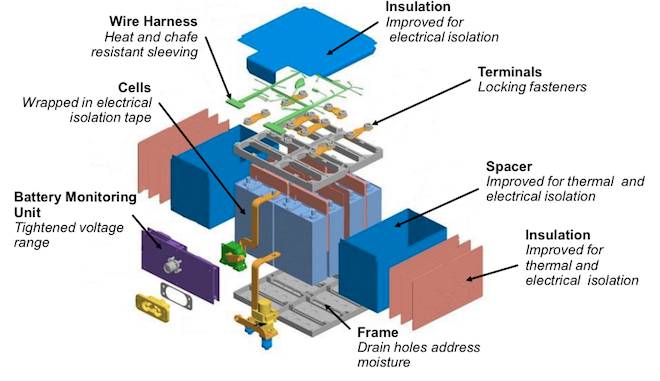This article is more than 1 year old
Boeing outlines fix for 787 batteries
Venting batteries produced 'smoke' that wasn't, no fire, performed as planned
Boeing has outlined plans to improve the performance and safety features of the batteries used in its 787 aircraft, after two of the planes infamously experienced on-board incidents at Takamatsu and Boston, but has stopped short of offering a thorough explanation for just what went wrong.
What is known is that something caused the batteries on two 787s to become very hot. Why that happened isn't known, but the company hinted, during a 90-minute presentation and Q&A session in Tokyo, that a “deep discharge” event occurred in one cell of the planes' batteries, heating it to the point at which it vented so much hot electrolyte that an adjacent cell warmed and also vented. A manufacturing fault seems to be the reason such an event was able to occur and the company has outlined three key improvements to stop this happening again.
Mike Sinnett, a Boeing vice president and chief project engineer for the battery fix, was at pains to point out that losing batter power won't mean a nasty end for a 787 flight, as the batteries operate for mere seconds in flight and even then only as bridges between other multiply-redundant power sources in the event the main power source isn't working. The batteries do the bulk of their work on the ground, powering systems when the in-flight generators aren't available.
On the contentious flights, “the cells vented,” Sinnett explained, “and the venting is a protective measure that when something happens in a battery cell the pressure and the heat can build up inside that cell. We vent the cell to prevent the pressure from building up too high and to keep the temperature down.”
“This is what happened in the [Japanese] Takamatsu and the [Boston's airport] Logan event. The heat from the cell propagated to other cells and they vented as well. This is a protective mechanism that is designed into the battery cells.”
But when the batteries vent, they leak vaporised electrolyte which looks like smoke. Sinnett insisted the visible vapours were “not the product of combustion [and] not the result of a fire.” Once the batteries vented, he said, all other systems worked as planned with flight crews notified after smoke detectors worked. The vaporised electrolyte was jettisoned overboard, so never posed a risk to passengers or crew.
Sinnett said the event cannot be considered a “thermal runaway”, and that Boeing's batteries have four levels of protection against the only known catalyst of such an event, namely overcharging. Sinnett said he is “very confident” Boeing has “never seen overcharging” in the 787 fleet. He also said he is content that Boeing's suppliers - GS Yuasa makes the batteries and Thales the charger – aren't at fault.
Both have nonetheless redesigned their contributions to the 787. GS Yuasa will “develop and institute enhanced production standards and tests to further reduce any possibility for variation in the production of the individual cells as well as the overall battery.” The battery box will acquire a, pardon the pun, battery of new insulation and isolation features and reside in a new stainless steel enclosure. All components will work in a newly-narrowed “acceptable level of charge for the battery” that will be achieved “both by lowering the highest charge allowed and raising the lower level allowed for discharge.”

The new and improved design for the Boeing 787 battery box
Another change will see “The battery charger … adapted to soften the charging cycle to put less stress on the battery during charging.”
All of these changes need to be certified before the 787 will fly again. Boeing says it's working to earn those certifications as fast as is practicable.
Senior executives said that once the changes are signed off, they'll happily board a 787, on the first flight if possible.
Boeing's almost-explanation of the incident is available as a PDF. ®
